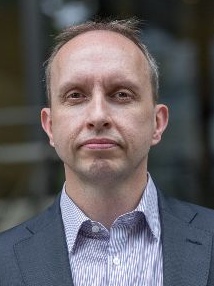Summary
The core expertise of the Armstrong group is synthetic organic chemistry: this includes catalysis, especially organocatalysis, stereocontrolled synthesis, and the synthesis of biologically active compounds. This includes new methods for drug discovery, including novel technologies for discovery of covalent electrophilic fragments that bind selectively to therapeutically relevant proteins.
Biographical details: Alan Armstrong obtained his BSc and PhD degrees from the Department of Chemistry at Imperial College London, the latter for work on the total synthesis of the milbemycin and avermectin natural products under the supervision of Professor Steve Ley FRS. From 1990 to 1992 he was an SERC/NATO Postdoctoral Fellow at Columbia University, New York, working with Professor Clark Still on the design and synthesis of novel podand ionophores for enantioselective cation binding. In September 1992, he returned to the UK to take up a Lectureship in Organic Chemistry at the University of Bath, moving on to the University of Nottingham in January 1996. He returned to the Department of Chemistry at Imperial College in September 1999 as Reader in Organic Synthesis and was promoted to Professor in October 2004.
From 2011-2015, he held a Royal Society Industry Fellowship with Pfizer Neusentis, aimed at developing new synthetic chemical biology tools to aid drug discovery. In 2016 he graduated with an Executive MBA from Imperial College Business School. He served as Head of Department of Chemistry from 2014-19, overseeing the building planning and move to the Molecular Sciences Research Hub on the College's new White City campus.
Alan is the recipient of the Royal Society of Chemistry Meldola Medal and Prize for 1995 (1996); a GlaxoWellcome Award for Innovative Organic Chemistry (1996); a Pfizer Academic Award (1999); an AstraZeneca Research Award (1999); the Novartis Young Investigator Award (1999); a Bristol-Myers Squibb Young Investigator Award (2000-2003); the Royal Society of Chemistry Corday-Morgan Medal and Prize for 2002 (2003); and a Novartis Lectureship (2008-2009). He has also been recognised for Excellence in Teaching with the Imperial College Rector's Award (2011) and President's Award (2015).
Publications
Journals
Gui L, Yu Y, Oliyide TO, et al., 2023, Integrating model-based design of experiments and computer-aided solvent design, Computers & Chemical Engineering, Vol:177, ISSN:0098-1354, Pages:1-15
Gui L, Adjiman CS, Galindo A, et al., 2023, Uncovering the most kinetically influential reaction pathway driving the generation of HCN from oxyma/DIC adduct: a theoretical study, Industrial & Engineering Chemistry Research, Vol:62, ISSN:0888-5885, Pages:874-880
Hocking B, Armstrong A, Mann DJ, 2023, Covalent fragment libraries in drug discovery-Design, synthesis, and screening methods., Prog Med Chem, Vol:62, ISSN:0079-6468, Pages:105-146
Muhieddine MH, Viswanath SK, Armstrong A, et al., 2022, Model-based solvent selection for the synthesis and crystallisation of pharmaceutical compounds, Chemical Engineering Science, Vol:264, ISSN:0009-2509
Zhong Z, Chesti J, Armstrong A, et al., 2022, Synthesis of sulfoximine propargyl carbamates under improved conditions for rhodium catalyzed carbamate transfer to sulfoxides, The Journal of Organic Chemistry, Vol:87, ISSN:0022-3263, Pages:16115-16126

